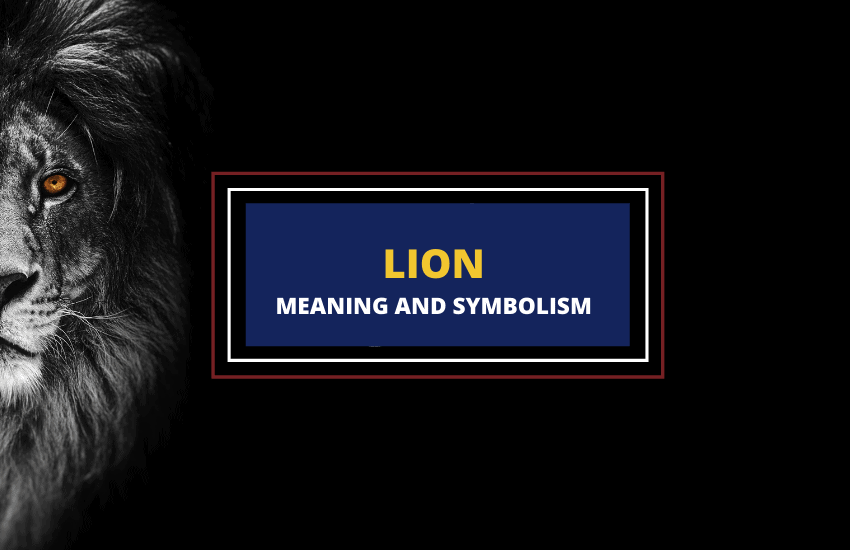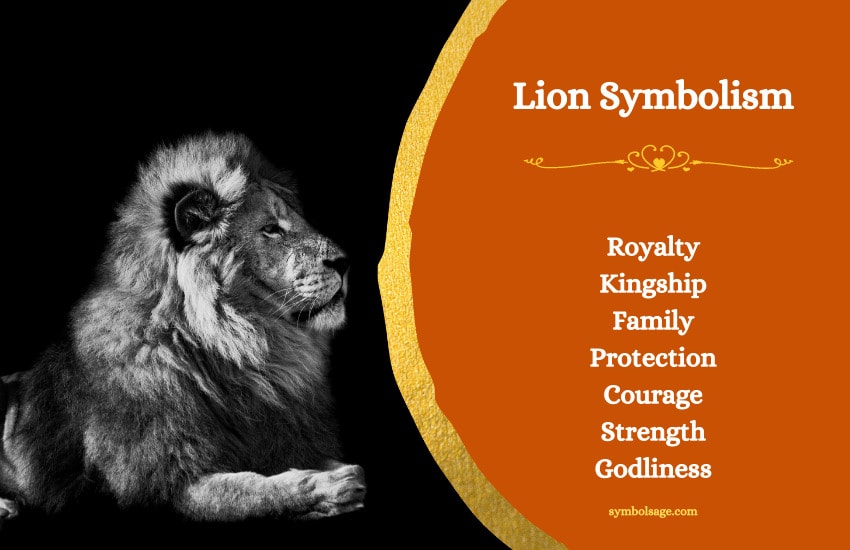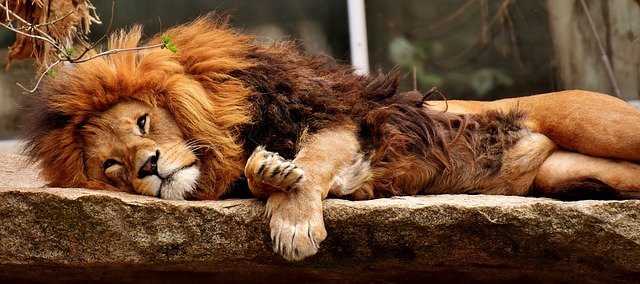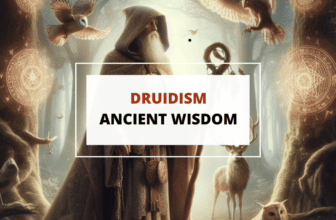
Table of Contents
Known to many as the King of the Jungle, lions have always been a popular subject in books and movies alike. People’s fascination with this majestic being has led to their diverse interpretation of what lions symbolize. From traits like strength and courage to values such as courage and justice, these mighty creatures are epitomes of admirable qualities, even though they’re terrifyingly powerful enough to tear through any prey they come across.
But why have lions become so influential that they became a mainstay in ancient folklore, modern literature, and even huge motion pictures? Read on to learn more about how people’s interpretations of lions evolved over the years.
Symbolism of Lions
- Courage and Godliness – It might seem obvious, but lions have always been associated with strength and bravery. In the Bible, people who walk the same path as God are considered as bold as lions. Proverbs 28:1 speaks of how wicked people ridden with guilt tend to run away even though no one is after them, while godly people remain as fearless as lions.
- Royalty and Kingship – In many cultures, people wore jewelry that bore lion emblems to signify their social status. In fact, in Swahili, the word simba which means lion is synonymous with the word king. Several books and movies have used lions as a symbol of royalty and authority, with The Lion King being one of the most popular ones. This classic Disney film tells the tale of how Simba, the son of the Lion King Mufasa, rose to the challenge of becoming the new king of the Pride Lands.
- Family and Protection – Lions also represent how families stick together no matter what. Since lions live and hunt in large groups, it perfectly represents how members of the family protect and nurture each other. These majestic animals are also very protective of their pride, so they are perfect symbols of how someone devoted to his loved ones keeps them safe from threats.
Some other concepts associated with lions, but which are also connected to the list above are:
- Authority
- Majesty
- Strength
- Wisdom
- Pride
- Affection
- Dominion
- Ferocity
- Dignity
- Leadership
- Self-confidence

Quick Facts About Lions
Although lions are mainstays in zoos and safaris all over the world, nearly all of them live near the Sahara Desert in Africa. Some of them have also made their homes in western India. In addition, they are highly adaptable so they can survive in extremely arid areas like the Kalahari Desert. They usually get the water they need from their prey and some wild plants like Tsamma melons.
With bodies that could weigh as much as 190 kilograms, it’s no surprise that lions are always portrayed as mighty and strong creatures. Their huge build also allows them to catch large prey like zebras and wildebeest, and to defend their pride from potential attackers. Male lions also grow long, dark manes that help them dominate fights by protecting their neck and head from most injuries. They also use their majestic-looking manes to attract female lions.
The dominant nature of lions can also be seen in how they hunt and feed on their prey. They could consume as much as 40 kilograms of meat in one sitting, and their tongues have sharp bumps that can easily scrape meat clean off the bones. Even their eyes were designed to help them hunt, allowing them to see in the night and even catch prey during storms.
Lions in History
Lions have been depicted in various ways in different countries and periods of history. Paintings of lions were seen in the Chauvet Cave, which was considered some of the earliest Paleolithic art known to man. This animal was also seen in tomb paintings in ancient Egypt, where a human was drawn standing with two lions. In addition, prehistoric records show that Sekhmet, an Egyptian goddess of war, was also depicted as a lioness because of her fierceness as a warrior. Egyptians paid respect to this deity and held a festival every year to appease her because she was believed to cause the annual flooding of the Nile River.
The status of lions as powerful symbols has remained over the years. They have been historically used in sculptures displayed in public buildings and entrances of cities. For example, in Mesopotamia, the Lion Gate of the ancient city of Mycenae in Greece continues to put people in awe. The massive gate features two lionesses posing on the opposite sides of a pillar. Meanwhile, in Cambodia, guardian lion statues are often seen in the temples of Angkor Wat, one of the eight wonders of the world.
Lions in Dreams

Like most elements in dreams, lions may also mean different things in different contexts. They say that if you see one in your dream and it’s not attacking you, it could mean that you’re either mesmerized by its beauty or imposing presence. Since lions are usually associated with traits like assertiveness and strength, you may be relating yourself to the lion that you’re seeing. It might also be a manifestation of your desire to become a leader or ruler.
If you dream of yourself being attacked by a lion, it doesn’t necessarily mean that you’re doomed. It could just be a sign that something has been bothering you and if you don’t face it head-on, you might experience failure. In addition, dreaming of being chased by a lion is somehow related to this. It means that you’ve been trying to run away from a threat, so it might be a good idea to evaluate the problems you’re facing and how you can proactively solve them.
Did you see yourself killing a lion in your dream? It might sound cruel and gruesome, but this is a good sign. It reflects your yearning for a position of power and your eagerness to do everything you can to overpower anything or anyone standing in your way.
Lions in Western Astrology
Lions represent Leo, one of the 12 astrological signs that are believed to represent people’s core personality as well as the way you react to different life events. Just like their animal sign, Leos are passionate, dominant, and full of life. They love being the center of attention and they are born natural leaders. While lions are kings of the jungle, Leos embrace their royal status in exclusive parties and lavish dinners.
Since Leos are ruled by the sun and it never goes retrograde, they are known to be very stable, consistent, and loyal people. They do everything they can to keep their relationships happy, dedicating their energy to keeping their friends and romantic partners happy. They are also very supportive, but they tend to react negatively when they’re threatened. There’s nothing they hate the most than someone stealing their thunder so they wouldn’t be happy if someone eclipses them – even if it’s someone close to their heart.
Lions in Tattoos
Lions are among the most popular animals used for tattoo designs, as they’re versatile and rich in symbolism. Much like how the king of the jungle stands out from all other animals, so does the lion in a tattoo.
There are many types of lion tattoo designs, including roaring lions, winged lions, lion and lamb, lion and cubs, and lion with crown, to name a few. There are several celebrities who sport lion tattoos, including Ed Sheeran, Justin Bieber, Demi Lovato, and Christina Ricci.
Wrapping Up
This article has explored the nature of lions, how people perceive them, and how they’re portrayed in different cultures, as well as their various traits and values that they’ve come to symbolize.
While lions may seem scary and intimidating, their dominant personalities and interesting characteristics make them stand out from the pack. If you’re thinking of getting a lion tattoo or wondering why you dreamt of a lion, knowing what they represent and what different cultures think of them is surely a great first step.
Who knows, your quest to understand lion symbols might lead you to discover things you didn’t know about yourself as well.








